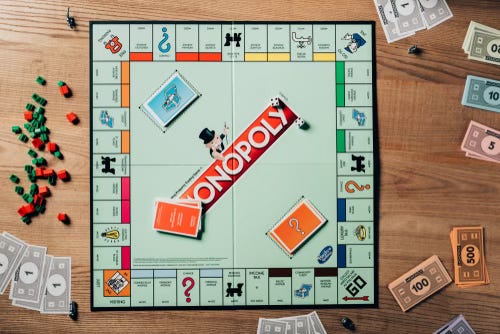How To Play Marxist Monopoly
I recently played Monopoly, but adjusted to reflect US income inequality; here's what I learned.
When the board game Monopoly was created in the first decade of the 20th century, toy inventor Lizzie Magie hoped it would teach Americans to question capitalism. A staunch feminist and progressive, Magie despised landlords and subscribed to the economic philosophy of left-wing theorist Henry George. Georgists, in turn, argued that every individual should solely own the value of what they produce themselves — even if their employers object — an added that the economic rent derived from land and other natural resources should be divided equally between all members of society.
Magie called her toy The Landlord’s Game and designed it to educate children. Later its name was changed to Monopoly and its purpose deranged: Instead of warning young people about capitalism, it tricks them into believing that capitalism is fair.
After all, each player in Monopoly receives $1,500, meaning they all have an equal shot at succeeding or failing in the game’s fictional business world. By contrast, at the end of 2024, America’s wealthiest 10 percent owned over two-thirds of US wealth, while the bottom 50 percent owned only 2.5 percent. The remaining three-tenths is divided among the remaining 40 percent.
If a game of Monopoly accurately reflected reality, it would include 10 players. One player would have $10,000; four players divide $4625 between them for roughly $1,156.25 per player; and the last five players would have to divide $375 between them, for a measly $75 each.
Unfortunately, I did not have 10 players at the ready for an authentic game of Marxist Monopoly. Yet I was able to create a substitute with four players, with a level of inequality still stark (though nowhere near as bad as real life): Two of us received $667, one received $666 and the “10 percenter” among us (chosen at random by lot) got to start with $4,000.
The “10 percenter” in our game was a 12-year-old elementary school student we will call Sophia; her close friend, with the nom de plume Rosette, is a 16-year-old high school girl; her mother, pseudonymously known as Maureen, is a 44-year-old nurse; and I’m a 40-year-old “crazy Jewish guy” (to paraphrase my review of “Eight Crazy Nights”). We didn’t play the game to completion, but went through three hours before the brutal summer heat and lure of slushies convinced us to call it quits.
At the time we did so, the rankings were as follows:
Sophia — $5,471
Rosette — $4,809
Matthew — $4,807
Maureen — $2,737
These numbers, though dispiriting on their own, were even more so if you played that game and weren’t Sophia. At no point, despite the other players’ best efforts, did any of us come close to approaching Sophia’s numbers. We wheeled and dealed, sometimes took risks and on other occasions played cautiously.
It made no difference. Sophia started out with more than six times the money as the rest of us, and that edge was enough to keep her comfortably ahead for the rest of the game.
Now imagine if the other players had only $75 to their names, instead of $666, as was the case in our game? Even playing with just $375 is breathtakingly difficult, as I know from someone who tried playing with more than $200 more than that amount.
I suspect Hasbro will never sign off on Marxist Monopoly, as currently envisioned. Then again, I wonder what the Georgist Lizzie Magie would have thought of this twist on her classic game. She may have balked at having her legacy twisted in this way.
Then again, it may be Hasbro’s sanitized, capitalism-friendly version of the game — rather than my alternative — that truly has sullied Magie’s legacy.
Back Seat Socialism
Column by Matthew Rozsa who is a professional journalist for more than 13 years. Currently he is writing a book for Beacon Press, "Neurosocialism," which argues that autistic people like the author struggle under capitalism, and explains how neurosocialism - the distinct anticapitalist perspective one develops by living as a neurodiverse individual - can be an important organizing principle for the left.


